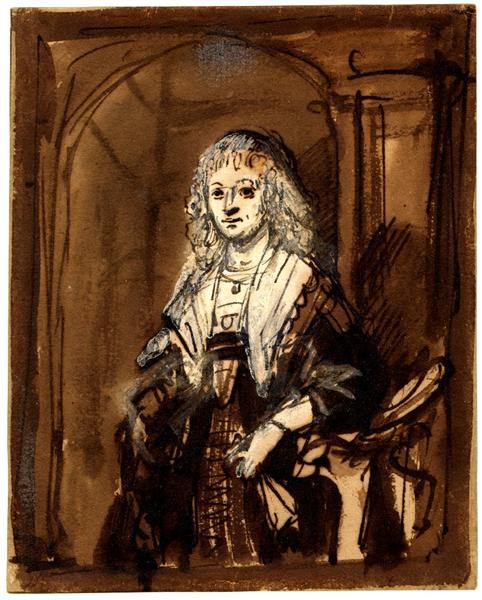Opis
Rembrandt's "Journey of Mary" (1639) is an eloquent testament to the Dutch master's ability to capture the emotional depth and complexity of the human condition through his masterful use of light and shadow, a method known as chiaroscuro. Illustrating a moment in biblical narrative, this painting focuses on the figure of Mary, shown in an act of movement and decision, suggesting a whirlwind of emotions and actions, characteristic of Rembrandt's style. The scene, though simple in terms of characters, is imbued with a dense narrative that presents a universal theme of journey and personal transformation.
The figure of Mary is depicted prominently in the centre of the composition, making her the unmistakable focus of the viewer. The articulation of her body and the style of her dress, contrasting against the dark background, highlight her importance in the scene. The colour palette used by Rembrandt is rich and warm, with earthy tones predominating, conferring a sense of intimacy and depth. The lady of the light filtering through, portraying Mary's face and hands, highlights not only her beauty, but also her vital role in the story being depicted. This use of colour is not just aesthetic, but invites the viewer to explore the emotional state of the character, revealing the dynamism inherent in the journey she is undertaking.
The use of space is also significant, as the composition moves in a diagonal direction that guides the viewer’s gaze towards Mary, suggesting both physical and emotional movement. Around her, the atmosphere is thick, almost palpable, creating an ambiance of anticipation and expectation. Although no additional characters are prominently displayed in this work, the context suggests a multitude of emotions and experiences accompanying the central figure, reflecting the multitude of feelings experienced in the act of travelling, of setting out into the unknown.
Within the corpus of 17th-century Dutch painting, Rembrandt stands out for his ability to evoke humanity in each of his works. In “Mary’s Journey,” the combination of his naturalistic style and his deep understanding of the human experience resonates with the viewer, inviting them to reflect on their own journeys and transitions. Rembrandt’s previous and contemporary works often explore similar themes, but in this particular piece, the figure of Mary becomes a symbol of hope and faith.
In conclusion, “Mary’s Journey” is not only a visual representation of a particular moment in time, but also a deeper reflection on the path of human life, resonating through the centuries. This work resonates with Rembrandt’s art goals: to communicate authentic emotion and the complexity of human experience through his technical virtuosity and keen perception. The work remains not only a point of reference in the artistic trajectory of the chiaroscuro renaissance, but also a beacon illuminating art’s ability to speak about the human condition through the centuries.
KUADROS ©, a famous painting on your wall.
Hand-made oil painting reproductions, with the quality of professional artists and the distinctive seal of KUADROS ©.
Painting reproduction service with satisfaction guarantee. If you are not completely satisfied with the replica of your painting, we will refund 100% of your money.

